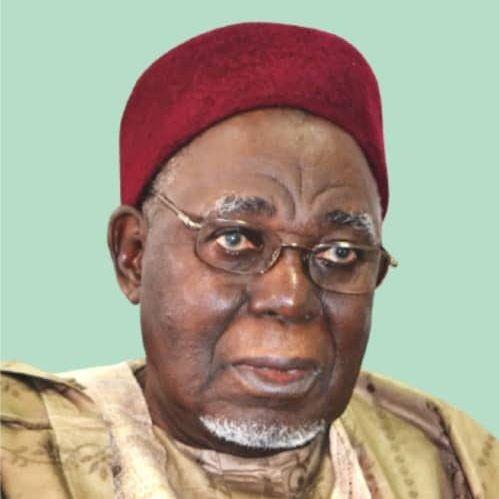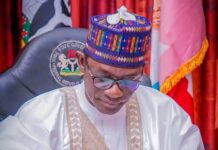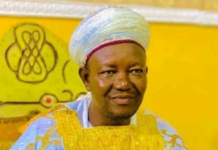Fond memories of Wazirin Fika, by Mahmud Jega
I had been hearing about Alhaji Adamu Fika, Wazirin Fika, since at least the early 1980s, when he was a Federal Permanent Secretary in Lagos, partly because many Fika Emirate students were my friends and his daughter, Hajiya Larai, was two years behind me in school.
I did not get to see him with my own eyes until 1991. I was a Principal Correspondent at Citizen magazine in Kaduna and there was some civil service reform issue during the Babangida regime. Our Executive Editor, Malam Adamu Adamu, phoned Waziri and asked for his views, and he said he should come to his house. Malam Adamu hurriedly dragged me from my desk and we sped off to Waziri’s house.
Waziri received us in his library, which had books and papers nearly reaching up to the ceiling. There were books, government gazettes, circulars, budget estimates and other papers dating back to colonial times, First Republic, Interim Common Services Agency [ICSA] days and military era. We were with him for 90 minutes. He spoke authoritatively on every civil service matter. Every now and then, Waziri stood up and plucked one circular or budget estimate from the bookshelves in order to prove his point. I was not told we were coming for an interview, so I had neither tape recorder nor note book.
When we returned to the office, Malam Adamu said I should write a story from what Waziri said. I was taken aback; with no notes? I could see, from how meticulously exact Waziri was, that it would be dangerous if I misquoted him, so the next day, without telling the editor, I appeared unannounced at Waziri’s house, this time with prepared questions. He received me warmly but refused to allow me to record the conversation, saying it was “just discussion.” So any time he stood up to fetch a book or an old gazette, I quickly scribbled what he just said in my note book.
Waziri told me many stories that day, including his disagreement with military President Ibrahim Babangida in 1988 that led to his forced retirement from service. Military governments in Nigeria since the 1960s usually merged the office of Secretary to the Federal Government [SFG] with Head of Service, but in 1986 Babangida separated the two offices, made Chief Olu Falae the SFG and made Waziri the Head of Service.
In 1988, IBB undertook some “reforms” of the civil service. As part of them, he wanted ministers to take over the function of Accounting Officers from permanent secretaries, whom he had renamed Directors General. As Head of the Federal Civil Service, Waziri stoutly opposed the reforms. IBB said, “You mean only civil servants are patriotic enough to protect funds?” And Waziri replied, “It is not a matter of patriotism but of training. Public funds are governed according to Financial Regulations. By the time any administrative officer rises to become a perm sec, he has already internalised FR [as old civil servants called it].” Of course IBB went ahead with his reforms, which were abandoned some years later. Waziri quit the service due to that quarrel.
The two men also clashed over the sale of government houses. IBB told Waziri in 1987 that the retiring Chief Justice of Nigeria, Justice Sowemimo, had asked for the CJN’s house to be sold to him. On IBB’s instructions, Federal Ministry of Works valued the house at N4 million. Waziri stoutly opposed the sale; he said if such houses had been sold since colonial times, there would have been none left by the time IBB became military ruler. He advised IBB to give the judge money to build another house instead.
I wrote a story out of that encounter [of course minus the salacious details], which was published in Citizen. I soon found out that Wazirin Fika was a regular visitor to Citizen’s office building because our landlord, Alhaji Mamman Jallo, was his close friend. Anytime Waziri came to see Jallo in his ground floor office, which was often, he sent for me to discuss one issue or another. Alhaji Mamman Jallo assumed that I was very close to Waziri, which was not quite correct. Whenever he did not see him for some days, he will send for me and ask me about Waziri!
Close to him or not, Wazirin Fika was extremely reluctant to lend anyone a book from his rich library. No wonder, because many of the books were out of print. It was with great difficulty one day that he lent to me colonial governor Sir Bryan Sherwood-Smith’s memoirs, But Always As Friends. I think he only did so because during our discussions, he saw serious gaps in my knowledge of Northern Nigerian history in the 1950s. I read it within 24 hours, so as to be in good stead to borrow more books. But it was the first and the last.
Since then, until in recent years when his health began to fail due to old age, Waziri called me innumerable times on the phone whenever he read my columns, usually to shed further light on an issue, or sometimes to dispute what I wrote. For example, in one article I wrote to mark the anniversary of Sardauna of Sokoto’s passing, I recounted a story that the late Wazirin Katsina Alhaji Isa Kaita once told on television. It was about how, in 1956 or thereabouts, Sardauna intervened forcefully with the colonial Governor of Northern Nigeria, Sherwood-Smith, in order to get the first Northerners appointed as Permanent Secretaries.
Waziri disputed the story. He said one of the rules that the colonial officers got Sardauna and other regional and federal politicians to agree to was that there would be no interference with civil service rules. It was very difficult for me to iron out this matter. I personally heard Isa Kaita telling this story in a TV documentary about Sardauna. He was Northern Minister of Education and one of Sardauna’s closest associates, but Waziri said it couldn’t have happened like that. Who am I to judge between these grand old statesmen?
Two years ago, I had what turned out to be my last meeting with Wazirin Fika at Abuja’s Hilton Hotel, where he lodged. I was helping his family to write a book about the late Brigadier Musa Usman, Military Governor of the old North Eastern State. Wazirin Fika was at ICSA in 1970 when the Military Governor invited him to go to the North East as commissioner. He said he initially turned it down but that Malam Liman Ciroma prevailed on him to accept, saying it was an honour for small Fika Emirate to have a representative in the Executive Council.
He became the Commissioner for Finance and later Education in Maiduguri under Musa Usman. Although they had some quarrels that time, Waziri turned out to be one of the most loyal devotees of Usman. Almost every year he wrote a tribute on the anniversary of the Brigadier’s departure in 1991. He told me a story about how he quarreled with the governor and stalled a project to build the North East’s first TV station but he told me that he later regretted his action. He left Maiduguri just before the coup that overthrew the Gowon regime, to join the Federal Service where, in the next 13 years, he was a permanent secretary in several ministries and subsequently, the Head of Service.
One of the issues I raised with Waziri in that encounter was the claim by some of the people we interviewed that Bauchi was the chosen capital of North Eastern State, that Brigadier Musa Usman initially operated from there, but that Borno elite later “hijacked” the capital to Maiduguri. It is a complicated story, but Waziri said Usman at first stayed in Bauchi because it was closer to Kaduna and that, every now and then, he was summoned to Kaduna and Lagos to perform one assignment or another related to the then ongoing Civil War. General Yakubu Gowon, who was also interviewed for the book, clarified that when he created states in 1967, he permitted them to go and change their capitals as they deemed fit.
Waziri, who was Deputy Executive Secretary and later Executive Secretary of ICSA [Interim Common Services Agency that inherited common assets of the old North and run them on the six states’ behalf], was a repository of knowledge about Ahmadu Bello University, Bank of the North, Hamdala Hotel, New Nigerian Newspapers, Kaduna Polytechnic, Arewa House and other entities almost without parallel anywhere.
In my encounters with Wazirin Fika, I came to the conclusion, perhaps erroneously, that he was very conservative and wanted everything to be done the old way. He was a stickler for propriety, procedure, records, rules and regulations such as I did not see in any other old civil servant in my three decades in journalism. Perhaps that made Waziri difficult to work with in some instances. During the Abacha era, Waziri became the first Chairman of Federal Character Commission. Our late colleague Dr. Sabo Bako was the Secretary. They soon fell out, not surprisingly, because Dr Sabo’s ABU Zaria lecturer’s habits were out of sync with Waziri’s grand old civil service habits. Abacha settled the quarrel when he reportedly said, “Tell that Doctor to return to ABU.” When Waziri was Pro-Chancellor and Chairman of Council of ABU, there was also some controversy over the appointment of a Vice Chancellor.
With his passing, we have lost one of the most upright men, an encyclopaedia on the public service, one with the best knowledge of the history and workings of the civil service, and a community leader without parallel who was always available to offer his rich store of wisdom on community issues and problems. At 90, he lived a long and rich life. May Allah grant Wazirin Fika eternal rest in Aljannat and give his family, Fika Emirate, Yobe State and all his numerous students and mentees the fortitude to bear this irreparable loss.
Follow the Neptune Prime channel on WhatsApp:
Do you have breaking news, interview request, opinion, suggestion, or want your event covered? Email us at neptuneprime2233@gmail.com





